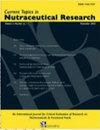川芎嗪通过抑制Wnt/β-Catenin信号通路减轻尿毒症大鼠肾损伤
IF 0.4
4区 医学
Q4 NUTRITION & DIETETICS
Current Topics in Nutraceutical Research
Pub Date : 2022-07-06
DOI:10.37290/ctnr2641-452x.20:698-704
引用次数: 0
摘要
尿毒症与肾损伤有关,可导致慢性肾功能衰竭。川芎嗪是中药川芎的一种生物活性生物碱,对急性肾损伤具有保护作用。研究川芎嗪在尿毒症相关性肾损伤中的作用。为了诱导尿毒症,大鼠进行5/6肾切除术并静脉注射生理盐水。大鼠肾切除5/6次后存活率降低,血尿素氮、血清肌酐、24 h尿蛋白升高。每天给这些大鼠服用川芎嗪增加了存活率,降低了血尿素氮、血清肌酐和24小时尿蛋白输出水平。此外,肾脏组织学分析显示川芎嗪还能改善肾脏的病理改变。最后,川芎嗪降低尿毒症大鼠肾组织中促炎细胞因子水平,抑制肾细胞凋亡。此外,川芎嗪可下调尿毒症大鼠Wnt1和β-catenin蛋白的表达,抑制β-catenin的细胞核分布。综上所述,川芎嗪通过灭活Wnt1/β-catenin通路,保护大鼠免受尿毒症相关肾损伤和肾脏炎症。本文章由计算机程序翻译,如有差异,请以英文原文为准。
Ligustrazine Alleviates Kidney Injury in a Rat Model of Uremia via Attenuation of Wnt/β-Catenin Signaling Pathway
Uremia is associated with kidney injury and contributes to chronic renal failure. Ligustrazine, a bioactive alkaloid from traditional Chinese herb Ligusticum wallichii Franchat, exerts renal-protective effect against acute kidney injury. The role of ligustrazine in uremia-associated kidney injury was investigated. To induce uremia, rats were subjected to 5/6 nephrectomy and intravenously administered with saline. Survival rate of rats was decreased by 5/6 nephrectomy, and levels of blood urea nitrogen, serum creatinine, and 24 h urine protein were elevated. Daily administration of ligustrazine to these rats increased the survival rate and reduced levels of blood urea nitrogen, serum creatinine, and 24 h urine protein output. Moreover, analysis of kidney histology showed that ligustrazine also ameliorated pathological changes in kidney. Finally, ligustrazine reduced levels of proinflammatory cytokines and suppressed renal apoptosis in the kidney tissues of uremic rats. In addition, ligustrazine downregulated protein expression of Wnt1 and β-catenin and inhibited nuclear distribution of β-catenin in uremic rats. In conclusion, ligustrazine protects rats against uremia-associated kidney injury and renal inflammation through inactivation of Wnt1/β-catenin pathway.
求助全文
通过发布文献求助,成功后即可免费获取论文全文。
去求助
来源期刊
CiteScore
1.10
自引率
0.00%
发文量
36
审稿时长
>12 weeks
期刊介绍:
Current Topics in Nutraceutical Research is an international, interdisciplinary broad-based peer reviewed scientific journal for critical evaluation of research on chemistry, biology and therapeutic applications of nutraceuticals and functional foods. The major goal of this journal is to provide peer reviewed unbiased scientific data to the decision makers in the nutraceutical and food industry to help make informed choices about development of new products.
To this end, the journal will publish two types of review articles. First, a review of preclinical research data coming largely from animal, cell culture and other experimental models. Such data will provide basis for future product development and/or human research initiatives. Second, a critical evaluation of current human experimental data to help market and deliver the product for medically proven use. This journal will also serve as a forum for nutritionists, internists, neurologists, psychiatrists, and all those interested in preventive medicine.
The common denominator of all of the topic to be covered by the journal must include nutraceuticals and/functional food. The following is an example of some specific areas that may be of interest to the journal. i) Role of vitamins, minerals, antioxidants and phytonutrients on cardiovascular health, cancer, diabetes, ocular health, mental health, men’s health, women’s health, infant nutrition, ii) Role of herbals on human health, iii) Dietary supplements and sleep, iv) Components of diet that may have beneficial effect on human health, v) regulation of apoptosis and cell viability, vi) Isolation and characterization of bioactive components from functional foods, vii) Nutritional genomics, and viii) Nutritional proteomics.

 求助内容:
求助内容: 应助结果提醒方式:
应助结果提醒方式:


